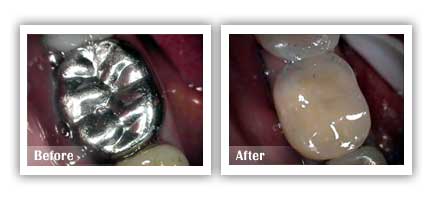Made from a wide range of materials, such as gold, nickel, stainless steel, resin, ceramic, platinum, porcelain, and different alloys, dental crowns are used for enhancing the appearance of teeth and gums, and thereby, the smile of a patient. Porcelain-fused-to-metal crowns are also a type of dental crowns.
Porcelain crowns, whether they are ‘all-porcelain crowns’ or ‘porcelain-fused-to-metal crowns’ are a popular choice amongst dentists and patients. Now, if you are unaware of the purpose or the types of dental crowns, you might wonder ‘why’. Well, they have gained this popularity due to the benefits that they provide. Most of the time, even patients who undergo this treatment don’t gather much information about porcelain crowns.

But worry not, as in this article, we have covered all the relevant details about how dental crowns made from porcelain are beneficial for people of all ages. We have also explained the objective and process of porcelain crowns restorative dental treatment in a nutshell.
Porcelain Crowns: What are They and How do They Work?
As you must have understood by now, a porcelain crown is a dental crown made from the porcelain material. The purpose of installing a porcelain crown is the same as the purpose of installing other types of dental crowns. Being custom-made according to the size, shape, and colour of the natural teeth of a patient, the crown covers the visible portion of the affected tooth. Dental crowns look like a ‘cap’ or a ‘cover’.
The objective behind affixing a porcelain crown to the tooth is to protect the structure of the affected tooth. As crowns act as a cap of the tooth, they hold it in place and help it stay firm. As porcelain material has a lot of strength, crowns made from it can perform the functions of chewing and talking effortlessly. Porcelain crowns restore the size, shape, structural integrity, and appearance of teeth.
Which Situations Demand the Installation of Porcelain Crowns?
Cosmetic dentists recommend the treatment of porcelain crowns to patients who have requirements, including but not limited to, restoring a broken tooth, restoring an extremely worn down tooth, preventing the weak tooth from breaking, holding a cracked tooth together, covering a tooth that has a large filling, beautifying discoloured tooth, correcting a misshapen tooth, and holding a dental bridge in place.
Porcelain crowns are also an ideal option in cases where an artificial tooth is required for placing over a dental implant, or a tooth that has been treated with a root canal needs to be covered. According to the condition of the affected tooth or teeth of a patient, the dentist chooses the suitable porcelain crown from the full crown and 3/4 crown.
How is the Process of Attaching Porcelain Crowns Carried Out?
The process of attaching the porcelain crowns takes a minimum of two visits to the dental clinic or hospital. During the first visit, the dentist makes the tooth and the surrounding gum tissue numb. Then, they remove the outer surface of the tooth to make room for the crown. If the tooth structure is not sufficient to support the crown, the dentist adds a core buildup to the tooth by using special filling material for providing support to a dental crown.
Then, the dentist takes an impression of the tooth with the help of paste or digital imaging. The technicians in a dental laboratory fabricate the porcelain crown based on this impression. The crown gets ready within two to three weeks. Until then, the dentist places a temporary crown on the affected tooth or teeth of a patient. During the second appointment, the dentist removes the temporary crown and installs the permanent crown by using dental cement.
Porcelain Crowns: What are the Benefits You Should Know?
The major benefit of a porcelain crown is that it keeps the natural tooth strong. You can restore both functionality and appearance of your teeth through porcelain dental crowns. The crown does not harm the natural teeth in any way. Porcelain crowns cause less abrasion to the surrounding teeth as compared to other types of dental crowns.
Dental crowns made from porcelain can last for as long as fifteen years, depending on how well you maintain your oral hygiene. As porcelain material shows resistance to stains, your dental crowns will look like new for years to come. You can eat and drink your favourite foods and beverages, respectively, without any fear.
Final Words
Porcelain crowns can replace missing teeth, strengthen weak teeth, and improving the look of stained or discoloured teeth. The treatment procedure of porcelain dental is simple, fast, minimally invasive, and cost-effective.
